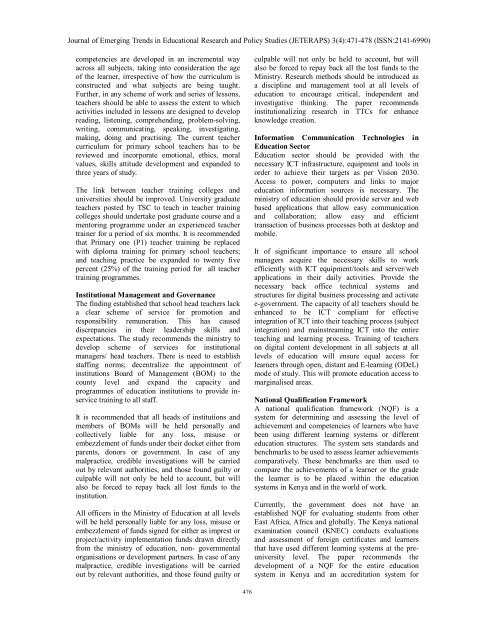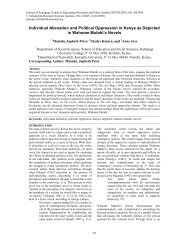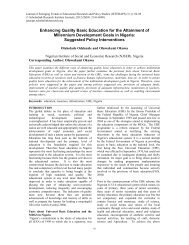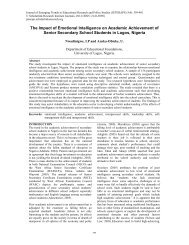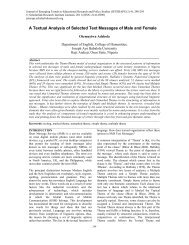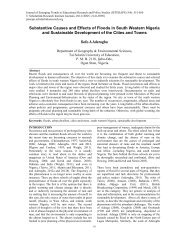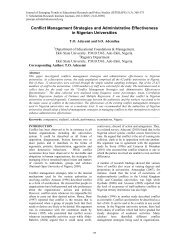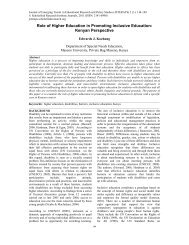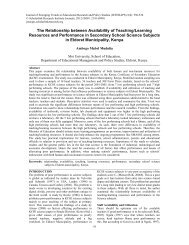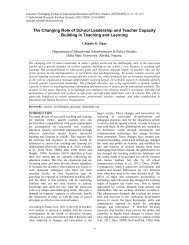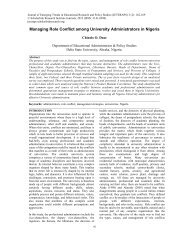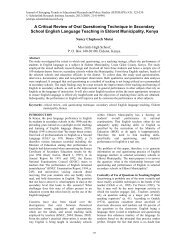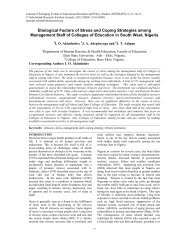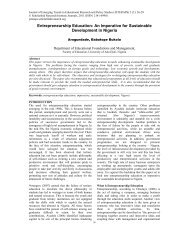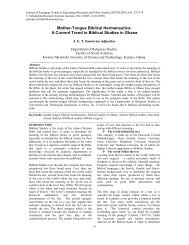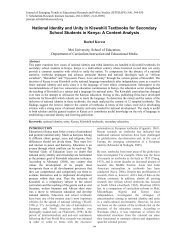Challenges and Reforms Facing Kenyan Education System in the ...
Challenges and Reforms Facing Kenyan Education System in the ...
Challenges and Reforms Facing Kenyan Education System in the ...
You also want an ePaper? Increase the reach of your titles
YUMPU automatically turns print PDFs into web optimized ePapers that Google loves.
Journal of Emerg<strong>in</strong>g Trends <strong>in</strong> <strong>Education</strong>al Research <strong>and</strong> Policy Studies (JETERAPS) 3(4):471-478 (ISSN:2141-6990)<br />
competencies are developed <strong>in</strong> an <strong>in</strong>cremental way<br />
across all subjects, tak<strong>in</strong>g <strong>in</strong>to consideration <strong>the</strong> age<br />
of <strong>the</strong> learner, irrespective of how <strong>the</strong> curriculum is<br />
constructed <strong>and</strong> what subjects are be<strong>in</strong>g taught.<br />
Fur<strong>the</strong>r, <strong>in</strong> any scheme of work <strong>and</strong> series of lessons,<br />
teachers should be able to assess <strong>the</strong> extent to which<br />
activities <strong>in</strong>cluded <strong>in</strong> lessons are designed to develop<br />
read<strong>in</strong>g, listen<strong>in</strong>g, comprehend<strong>in</strong>g, problem-solv<strong>in</strong>g,<br />
writ<strong>in</strong>g, communicat<strong>in</strong>g, speak<strong>in</strong>g, <strong>in</strong>vestigat<strong>in</strong>g,<br />
mak<strong>in</strong>g, do<strong>in</strong>g <strong>and</strong> practis<strong>in</strong>g. The current teacher<br />
curriculum for primary school teachers has to be<br />
reviewed <strong>and</strong> <strong>in</strong>corporate emotional, ethics, moral<br />
values, skills attitude development <strong>and</strong> exp<strong>and</strong>ed to<br />
three years of study.<br />
The l<strong>in</strong>k between teacher tra<strong>in</strong><strong>in</strong>g colleges <strong>and</strong><br />
universities should be improved. University graduate<br />
teachers posted by TSC to teach <strong>in</strong> teacher tra<strong>in</strong><strong>in</strong>g<br />
colleges should undertake post graduate course <strong>and</strong> a<br />
mentor<strong>in</strong>g programme under an experienced teacher<br />
tra<strong>in</strong>er for a period of six months. It is recommended<br />
that Primary one (P1) teacher tra<strong>in</strong><strong>in</strong>g be replaced<br />
with diploma tra<strong>in</strong><strong>in</strong>g for primary school teachers;<br />
<strong>and</strong> teach<strong>in</strong>g practice be exp<strong>and</strong>ed to twenty five<br />
percent (25%) of <strong>the</strong> tra<strong>in</strong><strong>in</strong>g period for all teacher<br />
tra<strong>in</strong><strong>in</strong>g programmes.<br />
Institutional Management <strong>and</strong> Governance<br />
The f<strong>in</strong>d<strong>in</strong>g established that school head teachers lack<br />
a clear scheme of service for promotion <strong>and</strong><br />
responsibility remuneration. This has caused<br />
discrepancies <strong>in</strong> <strong>the</strong>ir leadership skills <strong>and</strong><br />
expectations. The study recommends <strong>the</strong> m<strong>in</strong>istry to<br />
develop scheme of services for <strong>in</strong>stitutional<br />
managers/ head teachers. There is need to establish<br />
staff<strong>in</strong>g norms; decentralize <strong>the</strong> appo<strong>in</strong>tment of<br />
<strong>in</strong>stitutions Board of Management (BOM) to <strong>the</strong><br />
county level <strong>and</strong> exp<strong>and</strong> <strong>the</strong> capacity <strong>and</strong><br />
programmes of education <strong>in</strong>stitutions to provide <strong>in</strong>service<br />
tra<strong>in</strong><strong>in</strong>g to all staff.<br />
It is recommended that all heads of <strong>in</strong>stitutions <strong>and</strong><br />
members of BOMs will be held personally <strong>and</strong><br />
collectively liable for any loss, misuse or<br />
embezzlement of funds under <strong>the</strong>ir docket ei<strong>the</strong>r from<br />
parents, donors or government. In case of any<br />
malpractice, credible <strong>in</strong>vestigations will be carried<br />
out by relevant authorities, <strong>and</strong> those found guilty or<br />
culpable will not only be held to account, but will<br />
also be forced to repay back all lost funds to <strong>the</strong><br />
<strong>in</strong>stitution.<br />
All officers <strong>in</strong> <strong>the</strong> M<strong>in</strong>istry of <strong>Education</strong> at all levels<br />
will be held personally liable for any loss, misuse or<br />
embezzlement of funds signed for ei<strong>the</strong>r as imprest or<br />
project/activity implementation funds drawn directly<br />
from <strong>the</strong> m<strong>in</strong>istry of education, non- governmental<br />
organisations or development partners. In case of any<br />
malpractice, credible <strong>in</strong>vestigations will be carried<br />
out by relevant authorities, <strong>and</strong> those found guilty or<br />
culpable will not only be held to account, but will<br />
also be forced to repay back all <strong>the</strong> lost funds to <strong>the</strong><br />
M<strong>in</strong>istry. Research methods should be <strong>in</strong>troduced as<br />
a discipl<strong>in</strong>e <strong>and</strong> management tool at all levels of<br />
education to encourage critical, <strong>in</strong>dependent <strong>and</strong><br />
<strong>in</strong>vestigative th<strong>in</strong>k<strong>in</strong>g. The paper recommends<br />
<strong>in</strong>stitutionaliz<strong>in</strong>g research <strong>in</strong> TTCs for enhance<br />
knowledge creation.<br />
Information Communication Technologies <strong>in</strong><br />
<strong>Education</strong> Sector<br />
<strong>Education</strong> sector should be provided with <strong>the</strong><br />
necessary ICT <strong>in</strong>frastructure, equipment <strong>and</strong> tools <strong>in</strong><br />
order to achieve <strong>the</strong>ir targets as per Vision 2030.<br />
Access to power, computers <strong>and</strong> l<strong>in</strong>ks to major<br />
education <strong>in</strong>formation sources is necessary. The<br />
m<strong>in</strong>istry of education should provide server <strong>and</strong> web<br />
based applications that allow easy communication<br />
<strong>and</strong> collaboration; allow easy <strong>and</strong> efficient<br />
transaction of bus<strong>in</strong>ess processes both at desktop <strong>and</strong><br />
mobile.<br />
It of significant importance to ensure all school<br />
managers acquire <strong>the</strong> necessary skills to work<br />
efficiently with ICT equipment/tools <strong>and</strong> server/web<br />
applications <strong>in</strong> <strong>the</strong>ir daily activities. Provide <strong>the</strong><br />
necessary back office technical systems <strong>and</strong><br />
structures for digital bus<strong>in</strong>ess process<strong>in</strong>g <strong>and</strong> activate<br />
e-government. The capacity of all teachers should be<br />
enhanced to be ICT compliant for effective<br />
<strong>in</strong>tegration of ICT <strong>in</strong>to <strong>the</strong>ir teach<strong>in</strong>g process (subject<br />
<strong>in</strong>tegration) <strong>and</strong> ma<strong>in</strong>stream<strong>in</strong>g ICT <strong>in</strong>to <strong>the</strong> entire<br />
teach<strong>in</strong>g <strong>and</strong> learn<strong>in</strong>g process. Tra<strong>in</strong><strong>in</strong>g of teachers<br />
on digital content development <strong>in</strong> all subjects at all<br />
levels of education will ensure equal access for<br />
learners through open, distant <strong>and</strong> E-learn<strong>in</strong>g (ODeL)<br />
mode of study. This will promote education access to<br />
marg<strong>in</strong>alised areas.<br />
National Qualification Framework<br />
A national qualification framework (NQF) is a<br />
system for determ<strong>in</strong><strong>in</strong>g <strong>and</strong> assess<strong>in</strong>g <strong>the</strong> level of<br />
achievement <strong>and</strong> competencies of learners who have<br />
been us<strong>in</strong>g different learn<strong>in</strong>g systems or different<br />
education structures. The system sets st<strong>and</strong>ards <strong>and</strong><br />
benchmarks to be used to assess learner achievements<br />
comparatively. These benchmarks are <strong>the</strong>n used to<br />
compare <strong>the</strong> achievements of a learner or <strong>the</strong> grade<br />
<strong>the</strong> learner is to be placed with<strong>in</strong> <strong>the</strong> education<br />
systems <strong>in</strong> Kenya <strong>and</strong> <strong>in</strong> <strong>the</strong> world of work.<br />
Currently, <strong>the</strong> government does not have an<br />
established NQF for evaluat<strong>in</strong>g students from o<strong>the</strong>r<br />
East Africa, Africa <strong>and</strong> globally. The Kenya national<br />
exam<strong>in</strong>ation council (KNEC) conducts evaluations<br />
<strong>and</strong> assessment of foreign certificates <strong>and</strong> learners<br />
that have used different learn<strong>in</strong>g systems at <strong>the</strong> preuniversity<br />
level. The paper recommends <strong>the</strong><br />
development of a NQF for <strong>the</strong> entire education<br />
system <strong>in</strong> Kenya <strong>and</strong> an accreditation system for<br />
476


